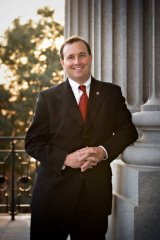
Whether it is called a "Bailout" or a "Economic Rescue," I have some fundamental problems with Congress passing this bill. Was it necessary? Maybe. Will it work? The jury is still out - we'll see how the market responds.
The question that I have is: Was it Constitutional? Under what Constitutional authority does Congress have to raise taxes on citizens of the United States, giving the money to the U. S. Treasury to buy private mortgages (good or bad) or securities or even to hold these types of real estate assets in the event of a foreclosure? Maybe they do under a broad interpretation of the Interstate Commerce provision - coincidentally used by the Roosevelt Administration to implement the social agenda called the New Deal in the 1930's or under the General Welfare clause of Article I.
So, in thinking about the bailout - let me share some quotes from the Founding Fathers and historical figures about the role of government as well as cautions from them:
George Washington once said: "The Constitution is the guide which I never will abandon."
"The first and governing maxim in the interpretation of a statute is to discover the meaning of those who made it." James Wilson, Of the Study of Law in the United States, c. 1790
"On every question of construction carry ourselves back to the time when the Constitution was adopted, recollect the spirit manifested in the debates and instead of trying what meaning may be squeezed out of the text, or invented against it, conform to the probable one in which it was passed." Thomas Jefferson, June 12, 1823
".....Certainly no such universal power was meant to be given to them. {The Constitution} was intended to lace them up straightly within the enumerated powers, and those without which, as means, these powers could not be carried into effect." Thomas Jefferson, Opinion on the Constitutionality of a National Bank, Feb. 15, 1791
"The legislative department is everywhere extending the sphere of its activity and drawing all power into its impetuous vortex." James Madison, Federalist No. 48, Feb. 1, 1788
"It would reduce the whole instrument to a single phrase, that of instituting a Congress with power to do whatever would be for the good of the United States; and, as they would be the sole judges of the good or evil, it would be also a power to do whatever evil they please." Thomas Jefferson, Opinion on the Constitutionality of a National Bank, Feb. 15, 1791
"If Congress can do whatever in their discretion can be done by money, and will promote the General Welfare, the Government is no longer a limited one, possessing enumerated powers, but an indefinite one, subject to particular exceptions." James Madison, letter Jan. 21, 1792
"No nation was ever ruined by trade, even seemingly the most disadvantageous." Benjamin Franklin, Principles of Trade, 1774
"I think all the world would gain by setting commerce at perfect liberty." Thomas Jefferson, letter to John Adams, July 7, 1785
"I think we have more machinery of government than is necessary, too many parasites living on the labor of the industrious." Thomas Jefferson, letter Sept. 6, 1788
"The principle of spending money to be paid by posterity, under the name of funding, is but swindling futurity on a large scale." Thomas Jefferson, letter May 28, 1816.
"The same prudence which in private life would forbid our paying our own money for unexplained projects, forbids it in the dispensation of the public moneys." Thomas Jefferson, letter June 19, 1808
"Excessive taxation.....will carry reason & reflection to every man's door, and particularly in the hour of election." Thomas Jefferson, letter Nov. 26, 1798
"To take from one, because it is thought his own industry and that of his fathers has acquired too much, in order to spare to others, who, or whose fathers, have not exercised equal industry and skill, is to violate arbitrarily the first principle of association, the guarantee to everyone the free exercise of his industry and their fruits acquired by it." Thomas Jefferson, letter April 6, 1816
"The powers delegated by the proposed Constitution to the federal government are few and defined." James Madison, Federalist No. 45
"One hundred and seventy-three(the number of Congressmen at the time) despots would surely be as oppressive as one." James Madison, Federalist No. 48, Feb. 1, 1788
"A democracy will continue to exist up until the time that voters discover they can vote themselves generous gifts from the public treasury." Alexander Tyler, 1787
I am fearful that this expansion of the power of the Federal Government will further erode our Republic. It, too, is obvious that the failures of past Congresses to regulate the mortgage industry, especially relating to Fannie Mae and Freddie Mac despite warnings in the Spring of 2001 (Bush Administration) and later in 2004(Bush Administration and Congressional Hearings) and 2005 (Congressional Hearings and McCain speech/Legislation Introduced), played a huge part in this economic meltdown. Both Republicans and Democrats are to blame and there are numerous YouTube videos of the hearings to satisfy your appetite as to these facts.
Remember ENRON? It seems that the guys from Freddie and Fannie (Franklin Raines and James Johnson) should be investigated and brought up on charges (for "cooking the books" that led to huge bonuses for them) the same as the ENRON officers. Maybe they will. But allowing this Congress, with the likes of Chris Dodd and Barney Franks, to investigate is like sending the burglar to investigate the burglary.


